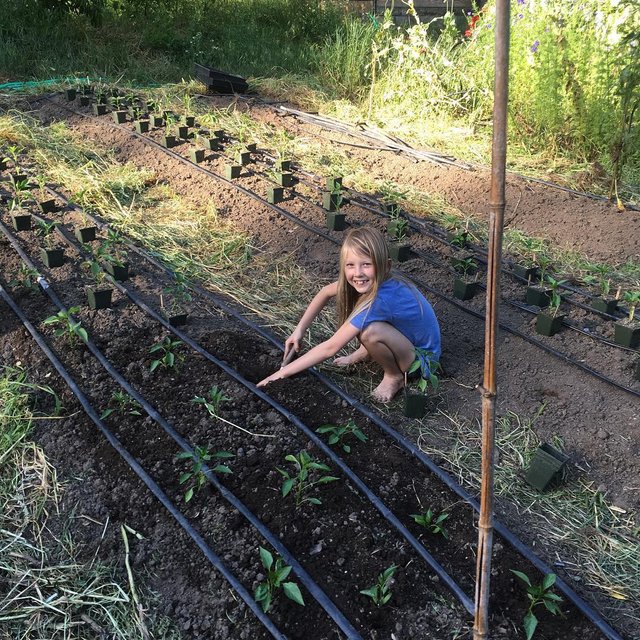Do or Don't Let Your Children Grow Up to Be Farmers?

I volunteer to work at an organic flower farm, Flora Farm, once a week and in return, I receive what I consider of utmost value - gorgeous blooms that brightens my day and lift my spirit.
I also learn a whole bunch from Stacey (the owner) about the realities of organic flower farming. For example, keeping up with the market demands for perfect blooms at a low value; losing crops to gophers and slugs; shouldering big expenses like greenhouses; juggling farmers' markets & wedding clients; and growing flowers for seed. In addition to all that, Stacey who runs the farm single-handedly, is also a single mom. This is not a unique story either...but one that is all too common.
Have you read the Opinion piece in the NY Times titled "Don't Let Your Children Grow Up to be Farmers"? The article paints a bleak picture of the organic landscape today and is especially harrowing about the reality of making a living (or not) as a farmer.
"The dirty secret of the food movement is that the much-celebrated small-scale farmer isn’t making a living. After the tools are put away, we head out to second and third jobs to keep our farms afloat."
Having on the ground experience, I can say, a lot of that is truth. And yet. Every time I look at the flowers that Stacey gives to me, the sweat of the day seem to evaporate along with my worries. As I look at those fragile, cheery blooms, knowing full well the amount of work that went into them, I feel all the more hopeful. Am I just an idealist?

Luckily, I'm also not alone. Here's an excerpt from a moving response to the NY Times piece:
"Let your children grow up to be farmers. Let them know what it is like to be free from fluorescent lights and laser pointer meetings. Let them challenge themselves to be forever resourceful and endlessly clever. Let them whistle and sing loud as they like without getting called into an office for “disturbing the workforce.” Let them commute down a winding path with birdsong instead of a freeway’s constant growl. Let them be bold. Let them be romantic..." (from Let Your Children Grow Up to Be Farmers")
What do you think? Do you think organic farming will become financially viable in the future? Will crypto change our current agricultural system? Would you encourage your kids to become farmers?
"Normality is a paved road. It's comfortable to walk but no flowers grow on it." - Vincent van Gogh.
I think the trouble with organic farming is the red tape. I know, a shocking response from team renegade. To have permission to label what you grow as organic requires farmers to wade through a lot of bureaucracy and expensive permits. Farmers then have to increase their prices to make up these ongoing expenses. These are just a few of the hidden fees behind the price of organic food that most people can't afford on a regular basis. And if people can't afford to buy what you're producing, how can you make a living?
Coming from a family of farmers, that article makes me sad. Although, I do recognize how expensive farming is to do. My uncles all have other jobs or businesses but they love farming. It's a lifestyle. All of my family that still farm together are so close with one another too.
Matt and I understand the struggle to start a farm. We've taken years to find affordable land and the expenses don't end there. We almost postponed having a family until we were set up but realized we might never have a family if we continued waiting.
I am hoping there is a movement afoot. That people are starting to understand CSA's and eating seasonally. That farmers can educate the masses to the benefits of locally grown food and supporting their home economies. That permaculture takes root and farmers can find methods of producing food without breaking the bank like most farmers are experiencing with traditional methods.
An additional side note, it's not just farmers struggling with this reality. Working for myself in graphic design and photography has been a constant struggle. Clients are always trying to pinch pennies and I am forced to work for low wages, or not at all. I had student loans following me around, and expensive gear to buy to run my business. And I'm sure there are more industries experiencing similar realities too. One has to wonder what's really going on. Why are so many business trying to operate on a shoestring budget? Why are consumers unable to afford locally grown and produced goods?
Thought provoking share! -Aimee
Aimee, thanks so much for your thoughtful comment. I always enjoy reading your insights. Two thoughts came to mind after reading your response. One is that the red tape and labeling ought to be put on big ag, whose methods are truly ethically questionable. The other is that organic farmers, rather than big ag, should receive subsidies instead of push back.
In regard to value/cost of food, this is another interesting issue. On the one hand, food has been made so cheap by mass production that it's difficult of us to pay more than what we're used to paying - especially if we are accustomed to budgeting based upon our wages/salary. To ask families to pay 2x more for food, while salary remains the same, seems unreasonable. On the other hand, if we look at it from the point of view of healthcare and the long-term cost of managing diabetes, obesity, heart attack, cancer, all which have been shown to directly correlate to the current diet/lifestyle, then the additional cost is actually unavoidable. Our healthcare system is another enormous financial beast - one I'd rather not feed.
On graphic design/photography...I know what you mean! Statistically, only 20% of new businesses succeed past their first year. According to that same article, the reason for such a low success rate is that most entrepreneurs underestimate the cost of running a business and the amount of time it takes to establish a customer base.
It seem to me that as we pose these questions and find ourselves banging our curious minds against the enormous walls of our system, we begin to see the many ways it prevents us from imagining anything different. And I think we must imagine as we are doing now and here so that something else can come to be.
I agree 100%. I am always perplexed as to why big ag is receiving subsidies, while organic farmers are being buried in paperwork. Especially when the government is often making statements about environmental accountability. They have no problem taxing us for the sake of the environment yet neglect to actually make intelligent changes to industrial practices. Instead of counting carbon particles, why are they encouraging something more useful like planting trees?
I understand budgeting all too well and asking people to pay more for their groceries when wages can't keep up with the ever increasing inflation is unfair. Some ask how I afford to shop at the farmers market but I often look for ugly produce because it's priced lower. Also, by shopping there often vendors want to reward my patronage by offering me better prices. We probably do spend more on our groceries if you include supplements but we figure we can either pay upfront and be healthy now, or pay later with declining health.
We might be dreamers but Matt and I really want to show people that sustainable agriculture is possible. We can work in harmony with the land, while staying fed and affordable. There seems to be an increasing number of permaculture farms and CSA's cropping up. Sustainability is the future and we want to be a part of the movement.
Cheers, Aimee
after some experience trying market organic farming in my 20s, i personally opted out of it for perennial agriculture. i think the model of perpetually tilling and starting annual crops is way too hard for the human system! it's a long story, but i don't think humans are willing to raise the price of food to accurately pay the labor wage of people who organically farm- it's so skewed from years of subsidized inflation.
i would encourage my kids to farm/garden for sure, but not to become market gardeners. it's a crazy hustle!! i think crypto is changing our lives personally. we've been able to subsidize our lifestyle here from blogging/vlogging on steemit :) that's def a positive!! hope to see more of it for people sharing alt lifestyles on the blockchain. .
good to see ya here lady!! xx
I agree with you on market farming! We made a decision against tilling and annual row cropping as well, especially not relying on it as a way of making a living. This year has been interesting for us because we're not yet living on our own land so we've been patiently holding off on planting a lot of perennials and instead are growing mostly annuals.
I've heard from other farmers that there's a new "serfdom" emerging with landowners renting to young farmers who then grow for CSAs and for market. I have friends who fall exactly in this category. Quite a few graduates of ag programs tend to go this route too. I'm mentioning this because I can see how this contributes to the tilling/annual growing pattern. I've also met CSA farmers who shared that they feel pressured by their consumers' expectations of getting annuals they're used to getting at supermarkets. So as long as there's demand for it, there will be those who will try to supply.
How do you think we could help shift our culture to perennial agriculture? Maybe through delicious food or education or free seeds...? We've been stuck on this question for the past few months :).
I'm glad crypto is subsidizing your lifestyle! It's helping us as well!
totally agree with your notes about consumer demand and people not knowing perennials very well. as far as shifting the culture-- i think we have to make it look cool! talk about it a lot! write articles on steemit and on other social media sites. slowly start slipping the perennial products into the market offerings (like jerusalem artchokes are already becoming more common fare) and educate the consumer. with enough "hip" people starting to shift the trend, it can really catch on and start to become more mainstream.
totally get not wanting to plant perennials cuz you wont be there to reap what you sow!! glad crypto is having such a positive influence in your life, too :)